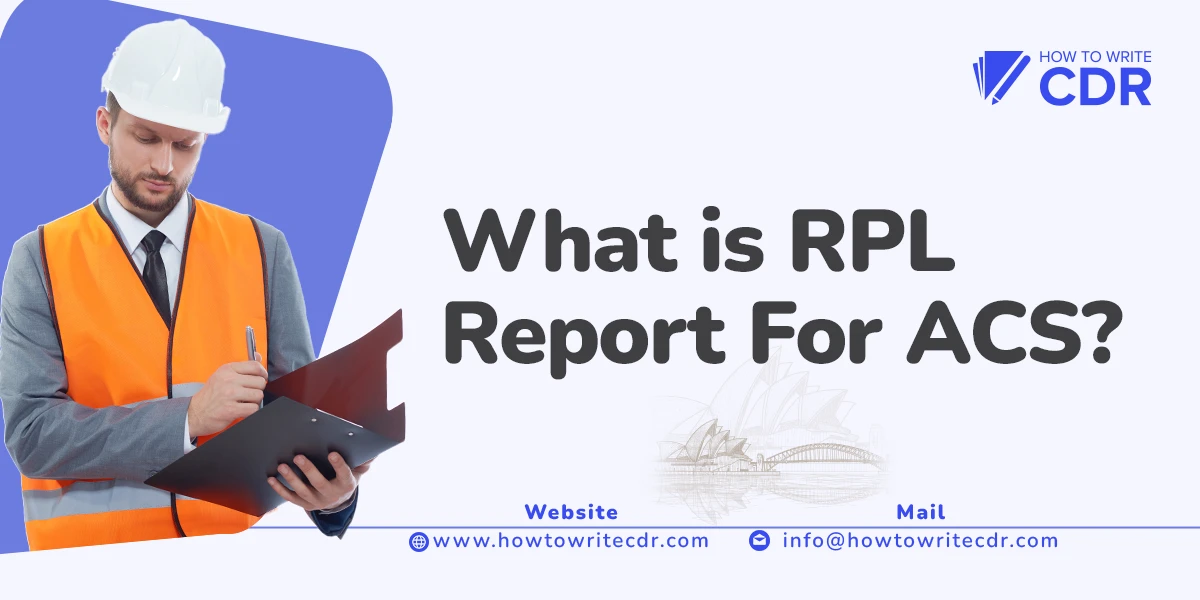
The ACS RPL Report is a document required by the Australian Computer Society (ACS). It is a part of the ACS skills assessment process for individuals seeking migration or employment in Australia in the field of ICT.
The ACS is the professional association for IT professionals in Australia which plays a crucial role in assessing the qualifications and skills of foreign ICT professionals.
Who needs an ACS RPL report?
The ACS RPL report is required by candidates to migrate to Australia as ICT Professionals. The RPL report is submitted to the Australian Computer Society (ACS). This report allows the ACS to evaluate the skills and qualifications of candidates applying for skilled migration to Australia. A positive ACS Skill assessment is a key outcome of this process.
To be more specific, an ACS RPL report is required for individuals who:
1. Lack formal ICT qualifications:
Applicants without recognized ICT qualifications or degrees in the field.
2. Have Insufficient ICT qualifications:
Those with qualifications that do not align closely enough with the Australian Computer Society’s standards.
3. Have No tertiary ICT education:
Individuals who do not hold any tertiary-level education in the field of Information and Communication Technology.
Candidates falling into any of these categories need to submit an ACS RPL report as part of their immigration application to Australia.
Steps in Preparation of ACS RPL Report
Before you start your RPL Report writing, there are things you should be careful about to avoid any mistakes and errors in your report. Consider the following:
1. Review ACS Guidelines
Familiarise yourself with the guidelines set by ACS. For research, visit the official ACS website.This will help you gain a clearer picture of what is required as every ACS assessment comes with specific criteria. This will be your foundation, your roadmap for the entire process.
2. Identify the Competency Units
Try doing thorough research on a wide range of the competency units and areas you are eligible for. Select the units which align with your qualifications and area of experience. Consider the following competency criteria:
- Technical Competency (Programming languages, Database management systems, Networking technologies and protocols, Web development frameworks and Cybersecurity principles)
- Project Management
- Research and Development
- ICT Policies and Procedures
- Professional Development
- Quality Assurance
3. Gather Evidence and Documentation
After knowing all the units and criteria of your work, gather all the necessary documents and evidence which are required to claim your ICT skills. Include employment references, academic certificates, project documents and other relevant documents.
4. Write Two Sections of the Report
The RPL report format contains two sections. The first section includes Key Areas of Knowledge and The RPL Project Reports. Here, write details about your job experience, skills and knowledge you have in ICT sectors.
5. Proofread and Edit
When you finish writing the report, you can now carefully review and proofread the content to identify any missing information or errors. Edit the error parts and make sure to meet the format requirements specified by ACS.
6. Final Submission:
Finally, submit your report with the required documents. Fill out the ACS project report form. You can submit them on their official website. Make sure to follow the submission process guidelines for ACS.
Professional Tips for writing ACS RPL report
Here are some key points to look at while writing an RPL report for ACS for better chances of acceptance:
- Find your ANZSCO code on the ACS website which explains things like how to show your competence.
- Avoid plagiarism. Reference sources properly if you have to include a certain part.
- Do not use duplicate content from online. Only take ACS RPL Samples for reference only.
- You should include authentic information for a valid evaluation.
- Choose the projects that are done in specific time periods i.e. last 3 or 5 years.
- Explain about the process and experience you acquired from the project.
- Discuss about 2 relevant subtopics from your project.
- Try to write in short paragraphs and concisely.Do Not explain any small topics on more than one page, keep it half a page.
- Describe how you obtained the required skill for that particular task and project.
- Ensure that you have overall experience and criteria that meet ACS.
- Submit documentation for ICT skills that you obtain during the career.
- No general restriction but the overall report should be around 20-25 pages, without evidence documents and appendices.
- Proofread the final report before submitting it.
What Are The Types Of Evidence Required For RPL Assessments?
There are three types of evidence required with the ACS RPL Report. This evidence is necessary as proof for ACS Skills Assessment. They are a part of skill assessments by ACS. You should provide all these 3 types of evidence for the ACS RPL assessment application. They are:
1. Direct Evidence
Direct (or Primary) Evidence are original factual samples that have not been modified or filtered through interpretation. Direct evidence helps to clarify and support your skills and knowledge in a specific area. Such as:
| Personal Information | Workplace Information | 3rd Party Information |
| Certificates / Qualifications | A portfolio of workplace documents that the candidate works with or developed themselves | Verified references from supervisors / peers / previous employers |
| Licences / Tickets | Samples of work, project or workplace records and forms | Record of RPL interview |
| Statements of Attainment | Photographs or videos of candidate work | Work Observation Record |
| Schedules, rosters or payslips | Work Skills Demonstration Record | |
| Workplace or industry awards, prizes, certificates | Knowledge Challenge Assessment | |
| Professional or trade memberships |
2. Indirect Evidence
Indirect evidence is the evidence supported by third-party verification documents and letters. Such as:
| Personal Information | Workplace Information | 3rd Party Information |
| Resume, Curriculum Vitae | Memos, Faxes, Letters, Plans, Reports, Emails written | Written references or letters of verification or support |
| Job Position / Description | Organisational Procedures / Policy / Charts / Checklists | Witness testimonies or customer / client feedback sheets / surveys |
| Diary entries | Minutes of meetings | Published articles |
| Training diaries / records | Completed job cards | |
| Performance appraisals / reviews | Industry Standards used |
Scope of ACS RPL Report
The ACS RPL report can be useful for different purposes.
- For Migration Purposes
It is mostly used for Migrating to Australia as ICT Professionals. Here, the candidate must showcase their relevant competencies. This report is commonly used by ICT professionals to gain permanent residency in Australia. The visa options are Skilled Independent(189)
and a skilled nominated(190) visa.
- For Job Mobility and Work
RPL report provides:
- Validation of Skills and Experience
- Competitive Advantage
- Career Progression
- Meeting Licensing and Regulatory Requirements
- Enhanced Confidence
- Access to Further Education
- Global Mobility
- Documentation for Self-Employment
- Professional Development
Even if migration is not your intention, this report can be a game-changer in today’s competitive job market.
Get Professional Help from How to Write CDR
If you find the task of independently composing an RPL report writing challenging or seek to maximise your chances of positive assessment, we encourage you to explore the benefits of engaging our services. We only deliver entirely plagiarism-free reports. Our dedicated team of certified and highly qualified professional writers at How to Write CDR stand ready to craft your report, offering an unwavering commitment to a 100% guaranteed success rate for your ACS application.
FAQs
Can I apply for ACS RPL if I have formal IT qualifications?
Yes, you can. The ACS RPL report is mandatory for everyone who is interested in immigration under skilled visas. Each candidate must submit this report to the Australian Computer Society for skill assessment, regardless if you have formal IT qualification (IT degree or diploma) or not.
How long does the ACS RPL process take?
Typically, ACS RPL processing time takes about 8 – 12 weeks. However, this timeframe can vary based on the complexity of each individual case and the volume of reports being processed. In some instances, it may take longer than the estimated range.
If any crucial information or additional requirements are found to be missing and are deemed necessary for the evaluation, you will be notified to provide the necessary updates. Consequently, this may extend the processing time beyond the initial estimate.
What happens if my ACS RPL report is not approved?
If your ACS RPL Report is not approved, it indicates that the Australian Computer Society (ACS) has rejected your submission for various reasons, potentially due to non-compliance with the required standards. In such instances, you will receive an official rejection letter from the ACS, outlining the Reasons for RPL Report Rejection.
Following this, you will have a singular recourse: to carefully assess the provided feedback and reasons for rejection, and make necessary revisions and enhancements to your report. You can then resubmit an improved version of your report.
In these cases, it is advisable to consider seeking professional assistance. Professionals such as How to Write CDR can provide expert guidance and support in revising your report, thereby enhancing your prospects of approval.
What is the RPL for the Australian Computer Society?
RPL stands for Recognition of Prior Learning. It is a formal document consisting of an individual’s knowledge and skills in IT. The RPL is assessed by the Australian Computer Society.
Can I include freelance work in my ACS RPL report?
Yes, you can include freelance work in the ACS RPL report. Australian Computer Society (ACS) accepts the experience from freelance work. Freelance work experience is considered valuable evidence of your knowledge and skill. It will help you demonstrate your practical knowledge, problem-solving skills and ability to provide ICT solutions independently without supervision. Make sure to include and highlight your roles and detailed information about the freelance project. You should also describe the technology you used during the project and future scope. Also, include the challenges you faced and the outcome.
